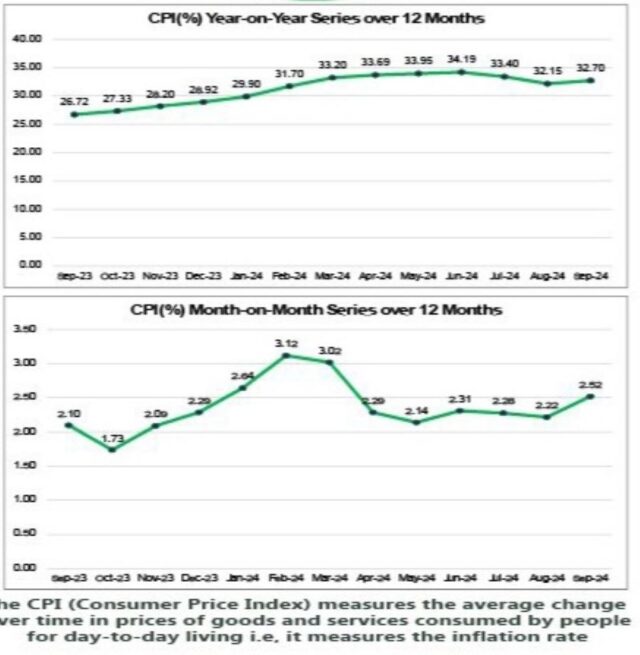…Purchasing power had continued to plunge over the past few months. The situation had been further exacerbated by the surging petrol price
…Headline inflation rose to 32.7% in September 2024 as against 32.15% in August 2024, an increase of 0.55%.
WED OCT 16 2024-theGBJournal| It is troubling that we are witnessing a resurgence of high inflationary pressures after some few months of respite despite policy measures to tame inflation, especially on the monetary side.
Purchasing power had continued to plunge over the past few months. The situation had been further exacerbated by the surging petrol price.
After a few months of deceleration, the inflation numbers had returned to a spiraling path. Headline inflation rose to 32.7% in September 2024 as against 32.15% in August 2024, an increase of 0.55%. There was also a marginal increase of 0.30% in month-on-month inflation between August and September.
Food inflation maintained its uptrend rising to 37.77% from 37.52% after decelerating in few months ago.
The reality is that the dynamics driving inflation are yet to be effectively subdued. These factors include the depreciating exchange rate, surging fuel price, rising transportation costs, logistics and supply chain challenges, high energy cost, climate change including resultant incidents of flooding, insecurity in farming communities and structural bottlenecks to production.
These are largely supply-side issues. There is also the factor of seasonality of agricultural outputs which activates seasonal price surge in some food crops. Elevated inflationary pressures escalate production costs, weakens profitability, and dampens investors’ confidence.
Not many investors can transfer cost increases to their consumers. The implication is that manufacturers and other investors are taking a big hit resulting from erosion of profit margins as a result of consumer resistance and weak purchasing power.
Tackling inflation requires urgent government intervention to address the challenges inhibiting production, productivity and security in the economy. The real sector of the economy needs to be incentivized to reduce production costs.
The government needs to offer concessionary import duty on intermediate products for industrialists. The effects of high energy cost and exchange rate on inflation is quite significant.
It will be very difficult to tame inflation if we do not substantially fix power, logistics and forex and security issues. Regrettably, there are no quick fixes in these areas.
But it is important to prioritize these issues and drive accelerated progress with the right strategies. Hopefully the proposed economic stabilization measures embodied in a bill currently before the national assembly would substantially address these concerns from the fiscal side.
Meanwhile, the sub nationals have critical roles to play in mitigating the challenge of food insecurity and food inflation.
They are closer to the stakeholders in the agricultural and food value chain and better placed to impact agricultural productivity.
The provision of rural roads by the states is also very critical to reduce transportation costs and ease access to markets.
The views of Centre for the Promotion of Private Enterprise (CPPE)
DR MUDA YUSUF is Director/CEO of the Centre
X-@theGBJournal|Facebook-the Government and Business Journal|email:gbj@govbusinessjournal.com|govandbusinessj@gmail.com










